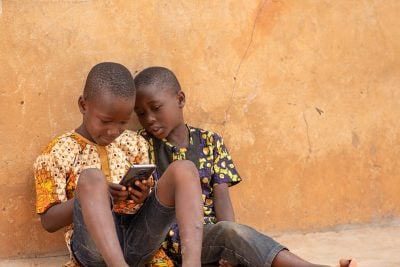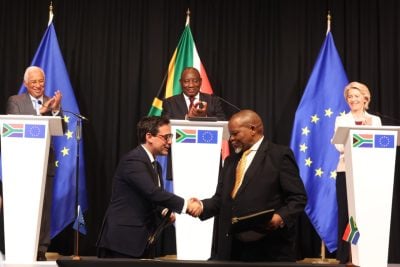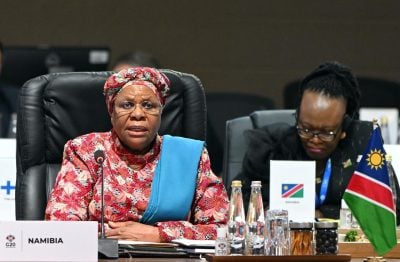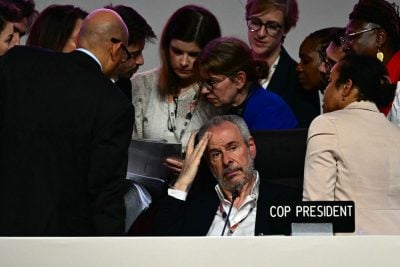At the end of September, Germany’s Federal Development Ministry (BMZ) announced plans to ramp up the country’s financial support of the Economic Community of West African States (Ecowas). Following a meeting between German development minister Svenja Schulze and Ecowas vice-president Damtien Tchintchibidja in Berlin, the BMZ promised to provide around €81m ($85.4m) in financial aid for peacebuilding and economic development programmes.
The move comes at a time when Ecowas is one of several organisations trying to restore stability to West Africa. There have been six coups in West Africa since 2020, with the latest coming in July this year when Niger’s army deposed and detained President Mohamed Bazoum.
Ecowas threatened to respond with military force to restore the democratically elected president but has not yet done so, partly because three suspended members – Mali, Burkina Faso, and Guinea – sided with Niger’s putschist government led by General Abdourahmane Tchiani. Critics have suggested that Ecowas’s failure to intervene in Niger and previous coups reveals an organisation that is weak and divided.
However, Germany’s renewed financial commitment to Ecowas suggests that European leaders see the organisation as crucial to the future stability of West Africa. When announcing the package, Schulze said that “solutions for the crises in West Africa must come from the region”.
Underlining the role of Ecowas as a central actor that not only mediates in crises but also does a lot to prevent them, she said that her role was to actively support the region’s solutions for peace and economic development.
“It is also about addressing the deeper causes of the conflicts,” she added. “This includes economic development that creates jobs for the young population, social security systems, and local authorities that visibly care about looking after people.”
While specific details of where Germany’s money will be going remain unclear, the German government has indicated that the money will be used to expand the Ecowas Fund for Regional Stabilisation and Development in Fragile Regions.
The Fund aims to prevent further coups by addressing the fundamental contributing factors to the overthrow of governments, such as unemployment and poor living conditions. To this end, part of Germany’s €81m donation will be used to expand West Africa’s electricity market and network, including the increased use of renewable energies. It is hoped this will help remove one of the region’s major obstacles to economic growth – insufficient and unreliable energy supplies – and thereby ultimately drive higher levels of employment and economic activity.
Michael Staack, chair of political sciences at Helmut Schmidt University in Hamburg and expert on German policy in West Africa, tells African Business that Berlin’s interest in the region is nothing new – but that the current environment of instability has pushed it higher up the political agenda.
“Germany identified West Africa as a region of interest many years ago,” he says. “Part of the reason for this is the region’s proximity to Europe. While Germany usually seeks to act as part of the wider European Union and align its foreign policy with other member states, both Berlin and Brussels are aware of how events in the Sahel can spill over into Europe, such as through increased levels of migration to the continent.”
Germany’s foreign minister, Annalena Baerbrock, made this point explicitly in May this year when she said: “when states in the Sahel fail, we feel the shockwaves here in Europe, too.”
“That’s why we must continue to support people in the region – by providing both civilian and military assistance,” she added.
Schulze also noted that political and economic instability in the Sahel can encourage the uptake of extremism and increase the threat of terrorist organisations committing atrocities, both in West Africa itself and in Europe. For these reasons, Staack notes that Germany has “self-interested as well as humanitarian motivations” for providing financial support to Ecowas.
Russian narratives gaining traction
Berlin may also have been encouraged to offer financial support packages to West African countries through Ecowas by the wider geopolitical context and the battle for influence in Africa among global powers. In particular, Russia has sought to develop ties with countries in the Sahel amidst the declining influence of colonial powers such as France and the failure of international actors to address the fundamental economic and political issues which have long dogged the region.
This prompted Germany’s defence minister, Boris Pistorius, to tell the German parliament in March that “Russian narratives and offers seem to gain traction here [in the Sahel], and the Western community is losing ground here… the Sahel is and will remain strategically relevant for precisely this reason, especially given the Russian presence in the region.”
Particularly as Germany begins a process of removing its troops from Mali, where it has deployed around 1,000 troops as part of a United Nations peacekeeping mission since 2013, Berlin appears to be looking for non-military ways of achieving its foreign policy goals in West Africa and retaining its influence in a “strategically relevant” part of the world.
Trade opportunities
Staack believes that some longer-term economic considerations are also at play in Germany’s decision to commit more funds to Ecowas.
“Trade between Germany and West Africa has grown in recent years, and the German government seems to see the economic potential of the continent, but many German companies remain quite conservative about investing in what is seen as a risky region,” he explains.
Indeed, in 2021 foreign direct investment (FDI) from Germany to Africa was around €1.6bn – less than 1% of its total outward investment flows, with most of the investment being concentrated in South Africa and a handful of northern African countries. Despite German industry expressing its interest in boosting their activities in Africa, particularly in the fields of renewable energy and natural gas, few companies apart from the major car manufacturers have established operations on the continent.
“The German government wants to facilitate increased trade with West Africa by playing its part in making the region more economically stable,” Staack says.
“This is both directly, by restoring political order and therefore reducing the levels of perceived and actual risk, and indirectly, by encouraging longer-term economic development and growth, that in turn could create new opportunities for German companies.”
While Germany is motivated to commit more funding to Ecowas for a variety of security, geopolitical, and economic reasons, Staack is sceptical about whether donations from Berlin will be sufficient to influence the politics of a troubled region decisively.
“Countries can only do so much with limited resources, and this is a positive step in some ways,” he says. “But it is unlikely that this will scratch the surface of the deep-rooted problems West Africa is facing amidst coups and political and economic uncertainty.”
Want to continue reading? Subscribe today.
You've read all your free articles for this month! Subscribe now to enjoy full access to our content.
Digital Monthly
£8.00 / month
Receive full unlimited access to our articles, opinions, podcasts and more.
Digital Yearly
£70.00 / year
Our best value offer - save £26 and gain access to all of our digital content for an entire year!
 Sign in with Google
Sign in with Google 



